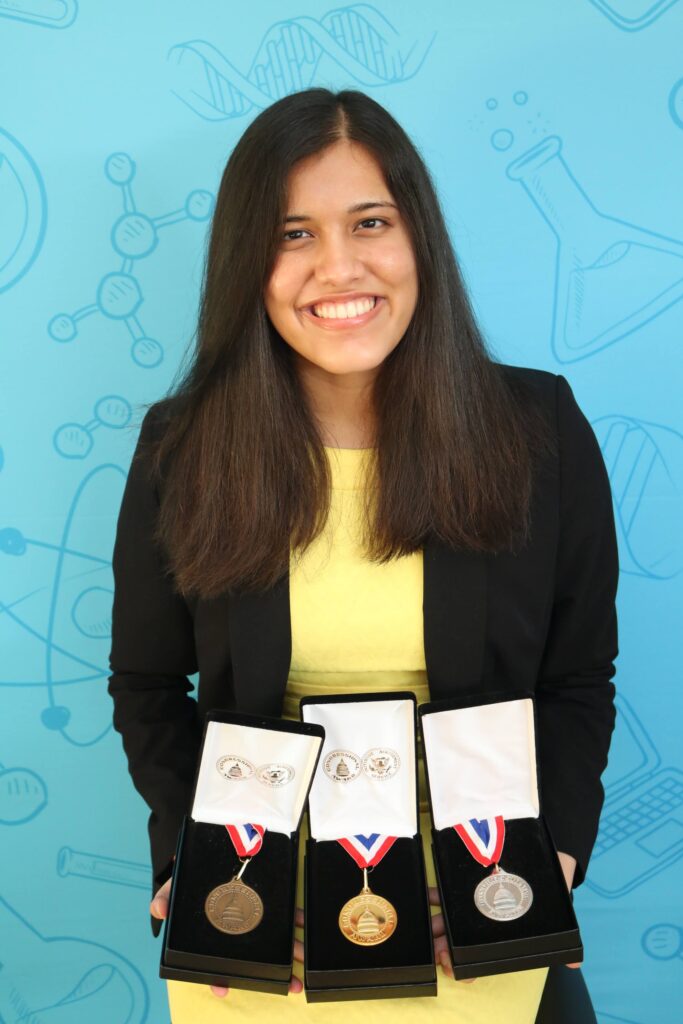Senior named finalist in Regeneron Science Talent Search Contest
Evan Ponstingle | Staff Writer

Mason High School is home to many talented individuals with unique talents. Now, for the first time in school history, MHS is home to a finalist in one of America’s most prestigious science competitions.
Senior Laalitya Acharya has been named a Top 40 finalist in the Regeneron Science Talent Search (STS) contest, giving her a $25,000 scholarship. The Regeneron contest is one of the most esteemed high school science competitions in America. Being named a finalist, Acharya is in prestigious company, alongside 13 Nobel Prize winners and 21 MacArthur Foundation fellows.
Acharya has been exploring her passion for science since she was a young girl: “My first experiment was with Coca Cola– I’m a big fan of soda, and when I was younger my parents wouldn’t give it to me, so I decided to create my own version,” Acharya said. “That just grew into being curious about the world and experimentation, which got me into learning about computer science and biology, which just culminated in my research.”
Acharya got her foothold into the Regeneron contest in seventh grade, when she was involved in a program run by the Society For Science, the same company that hosts the contest. “[The Regeneron STS] was an incredible opportunity for me to learn about scientific research and engage with other peers who love science,” Acharya said.
For her submission into the contest, Acharya created a neural network device that detects contamination in water at the microbial level. She was inspired to create this invention following a family trip to India, when her eyes were widened with the lack of access in the nation to clean water.
“People [in India] lack access to clean water and even with the [precautions] that my parents and I took like boiling water and not eating raw food, I still felt sick from drinking contaminated water,” Acharya said. “It’s a huge issue– billions of people fall ill and millions die across the globe.”
After learning of the lack of access to clean water India, Acharya realized that she held the key to helping people who faced this problem by developing a new and innovative creation.
“I already had some previous experience in coding, so I wondered if I could use that experience that I had and apply it to this crisis,” Acharya said. “I decided to use Artificial Intelligence processing to process images, and it would take the microscopic images, analyze them and then determine if contamination is present.”
Acharya initially started developing the device in February 2019, intending to enter it into the science fair circuit. As the Regeneron STS approached in November 2020, Acharya decided to submit it as a part of the contest. In January 2020, Acharya was named a Top 40 Finalist
“They called us a day before they publicly announced it,” Acharya said. “I knew that the phone calls would be coming in that day, and I got a call from [Washington] DC, so I picked it up and [was told] that I was a finalist!”
Being named a Finalist, following in the footsteps of so many prestigious others, has been the manifestation of a longtime goal for Acharya– one that dates back to her middle school days.
“I was in middle school and I read about the finalists then, and their projects were so inspiring to me,” Acharya said. “I always dreamed of being amongst the ranks of them and to be a finalist is incredible and mind blowing. I still don’t think I fully comprehend that.”
In March, the 40 finalists will be competing for the top prize. But beyond the competition aspect, Acharya is looking towards continuing her research and continuing to pursue her science goals and career.
“It is such an honor to be able to be a finalist that I hope it’ll help me get more research and career opportunities down the road,” Acharya said. “Obviously, the scholarship will help on the monetary side of it as well.”
Acharya has wise words for other people looking to enter this high-profile competition: failure might seem like a setback, but in reality, you can use it as a step forward.
“Don’t be afraid to fail,” Acharya said. “One thing that I always say is that science isn’t linear. A lot of times in school, we’re taught [the process is] hypothesis, question, data, results. In reality you might have to go back to the drawing board, scrap everything, and try again. And you will fail and that is okay, as long as you just come back and keep on getting back at it.”
Photo contributed by Laalitya Acharya
